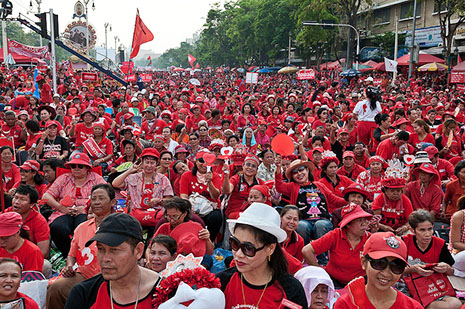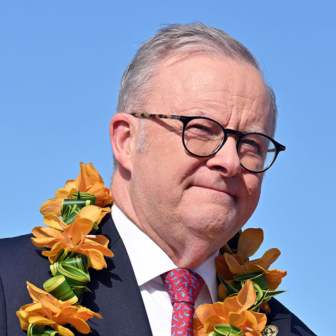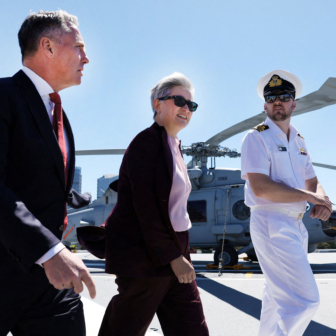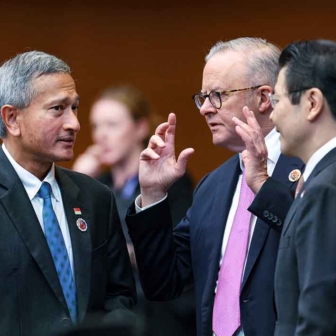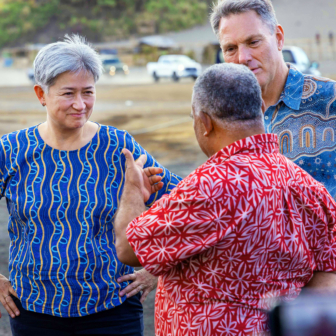“DELICIOUS,” exclaimed Vuthithorn “Woody” Milintachinda, a popular Thai talk show host, as he nibbled the cupcake being fed to Princess Chulabhorn Walailak’s dog. This was one of the lighter moments in a televised interview in early April that saw the boyish host performing with all the reverence that might expected in a Thai-style royal audience.
Genuflecting on the floor and deploying the ornate royal register of the national language, Woody shed tears as the princess reflected on the current troubles facing the country, her family’s service to the nation and her pride in the achievements of her father, King Bhumibol Adulyadej.
The king has been on Thailand’s throne for almost sixty-five years; he is the longest-reigning monarch on earth. During those decades a once diminished and fragile monarchy has returned to the apex of Thai society and politics. Cries of “Long live the king” now reverberate far and wide as royalist supporters of the frail and hospitalised monarch seek to monopolise discussion of national security, prosperity and identity.
Princess Chulabhorn’s interview with Woody was a rare treat for Thailand’s countless royalists. Her exhortations for a more united society were matched by an insistence that her family is committed to “hard work serving the people.”
Thais are brought up on a diet of gushingly formal reportage about royal achievements, framed in the sometimes impenetrable language reserved for the palace. While they rarely address the nation directly, members of the royal family are a constant public presence on the nation’s television screens. It is far less common for individual members of the 229-year-old dynasty to be questioned about their personal views.
In the official telling, the entire family – King Bhumibol, his wife Queen Sirikit, their four children, and a long list of less significant royals – are inseparable from the success of modern Thailand. Devotion is expected from across Thailand’s political spectrum. King Bhumibol’s children have been ordained as exemplars of martial, intellectual and scientific achievement.
So when Princess Chulabhorn used the interview with Woody to reflect on Thai society, her father’s health and his political and economic legacy many people were deeply moved. Afterwards, hundreds of thousands of Thais descended on the internet to watch YouTube versions of the interview. Some reported that they had “tearfully” watched Princess Chulabhorn explaining her trials and those of her family. Many viewers reflected on how proud they felt to be “born as Thais.” Some voiced their disgust at the minority among their number who opted to “dislike” the interview, with one suggesting that such people “have a lack of awareness about what it means to be Thai.”
ALTHOUGH Woody’s interview with Princess Chulabhorn might strike foreign viewers as overwrought and incongruous, it was part of a strategy to refocus Thai attention on the monarchy at a particularly sensitive moment: the first anniversary of some of the most contentious events in Thai political history. The interview, and the unusual access required to facilitate it, was part of a royalist effort to neuter anti-establishment forces and the sometimes radical demands they make about Thailand’s future.
Those demands received their loudest airing in April and May 2010 when tens of thousands of Red Shirt protesters, many of them supporters of the deposed former prime minister, Thaksin Shinawatra, descended on central Bangkok. Since the coup of September 2006 removed Thaksin’s electorally successful government there has been constant tension, and occasional conflict, between his supporters and those who back the coup-makers and their allies.
To join the protests of April and May, many of Red Shirts came from the provinces of the north and northeast; others were residents of Bangkok and its sprawling suburbs. Their occupation of strategic intersections in the city led to two episodes of significant violence, the first on 10 April and the second, much more bloody, from 13–19 May. Often armed only with slingshots and homemade rockets, Red Shirt forces squared off against the might of Thailand’s security apparatus and the government of Prime Minister Abhisit Vejjajiva.
It’s likely that some among the Red Shirts carried more deadly weapons, which provided the Thai military with a reason to show little restraint in its effort to dislodge the protesters. By the end of the standoff in Bangkok at least ninety-one lay dead, more than a thousand had been injured, and dozens of buildings had been burned. The nation lurched into mourning. Hoping to reinforce its authority and claims to legitimacy, the government commenced a wider crackdown, especially against the most vulnerable dissidents. These efforts have been accompanied by public campaigns to discourage a resurgence of Red Shirt politics.
The quandary for analysts of Thai politics since that crackdown is that so much blood was spilled but so few answers proffered. Prime Minister Abhisit and his advisers have no stomach for a public acquittal of events. They naturally fear the prospect of scrutiny falling on this untidy period of blood-letting and state-sanctioned repression.
For the past two months, Abhisit and his spokesmen have sought to give the impression that a national election is imminent. Their goal is to garner enough votes to cobble together a refreshed coalition government that can hold off the Puea Thai opposition allied to Thaksin. Puea Thai is the formal party-political apparatus most closely allied with the Red Shirts and, as such, has some links to the subversive, anti-establishment ideas that stew below the surface of Thai society.
Prime Minister Abhisit imagines that in mid-2011 a window will open in which his chances of electoral success are high. Some claim he is intent on an election close to 9 June, when the country will celebrate the sixty-fifth anniversary of King Bhumibol’s reign. His party, the Democrats, has an unremarkable record at the polls and must still feel vulnerable to the populist dissent of the Red Shirts. But the booming economy is a major advantage for Abhisit. Incumbency has advantages in all electoral systems and the prime minister is well aware that dispensing largesse to strategic constituencies will surely maximise his chances of winning enough votes to stay in power.
Meanwhile, popular support for Thaksin has longstanding economic foundations. He is still widely remembered for his generous handouts, his emphasis on provincial and rural development, and the economic boom that he claimed as his own. But economics is not, in 2011, the only matter at stake for many critics of the Abhisit government. There are four main issues where dissent registers strongly.
First, both moderate and radical anti-establishment voices are increasingly focusing critical attention on the royal family and its advisers. Criticism of Queen Sirikit has become strident, and attacks on the Privy Council, especially its chairman General Prem Tinsulanonda, have not faded. WikiLeaks provides new fodder: its revelations about the behaviour of members of the royal family, especially Crown Prince Vajiralongkorn, have served to re-energise anti-monarchy talk.
It is on the internet that new frontlines are particularly clear. Campaigns against Article 112 – the component of Thailand’s Criminal Code that outlaws critical references to the royal family – are now a well-defined part of more radical political campaigns, which draw strength from anonymous communities of online agitators. The palace must fear that seditious narratives are becoming part and parcel of Thai political discussion. Some commentators have even seized the opportunity to ridicule Princess Chulabhorn for her appearance on Woody’s chat show.
Second, accusations of double standards are politically potent. The differential treatment of Red Shirt political activists and their royalist street opponents is a particularly blatant example. Anti-establishment Red Shirts languish for months or years without bail while royalists, some of whom have been charged with equally serious offences, continue their activism with apparent impunity.
Indeed, in any forthcoming election campaign the most potent rhetoric will focus on issues of political and economic inequality. Even many Thais who have been economically or socially successful feel disenfranchised by the establishment. At the time of the 2010 protests one commentator astutely observed that it was the “aggrieved with assets” who spearheaded the anti-government movement. The key economic arguments marshalled for their cause concern relative poverty rather than absolute destitution.
Third, Thailand’s military has reverted to open political meddling. Until the 2006 coup the consensus among analysts was that the Thai army had returned to its proverbial barracks and was no longer ideologically capable, even while it retained the logistical and operational resources, of direct political action. That impression was pulverised by the 2006 coup.
In recent weeks the most senior Thai armed forces commanders have gone so far as to announce their unwillingness to stage a coup. That such statements are necessary reflects the high probability that, depending on circumstances, a coup could be launched. It has now become an annual rite to speculate on such a prospect.
The role of the military has been further complicated by its enmeshment in this year’s conflict along the Cambodia–Thailand border. In February, a series of border skirmishes resulted in unknown numbers of casualties on both sides. The clashes have been followed by a noisy stalemate during which both governments hope to reinforce their claims to the disputed Preah Vihear temple complex and surrounding land. It is a messy and undesirable situation, but one that fortifies the impression that the Thai military is playing political games for its own distinctive purposes.
Fourth, the status of former Prime Minister Thaksin is unresolved. For anti-government groups he remains a figurehead and a still credible future leader of the country. His five-year ban from formal politics expires in May 2012. In the meantime, he continues to motivate Red Shirt rallies with his videolinks from exile. One recent event in the northeastern province of Udon Thani drew at least 60,000 supporters, the biggest Red Shirt rally since the end of the protests in May 2010; such activism is intensifying in the lead-up to the potential 2011 election.
Thaksin, among many others, has played this particular game before. The Red Shirts are well aware that building momentum in the provinces will help them to future electoral success. But the success of Thaksin-aligned politicians is not guaranteed, and there is a significant chance that they will be out-manoeuvred by a government that has enjoyed more than two years to consolidate its influence and its control of the levers of patronage.
At the same time there is an unresolved civil conflict in Thailand’s southern-most provinces. That conflict is entrenched through a barely understood nexus of criminal, Islamist, political and commercial interests, all fuelled by an awareness that the violence has become good for business. The military has enjoyed significant growth in its budgets since the 2006 coup and the conflict in southern Thailand is ample pretext for continued expansion and influence.
ALONGSIDE these issues there is deeply felt, but largely unspoken, anxiety about what the passing of King Bhumibol will mean. He is now eighty-three years old and has been hospitalised since September 2009. With only rare public appearances, and no recent utterances, the country’s longest-reigning monarch is slowly, but surely, disappearing from view.
In her recent interview Princess Chulabhorn sought to reassure the nation that King Bhumibol remains industrious and that his health is “normal.” But this doesn’t help to clarify what happens next. On the one hand there is Crown Prince Vajiralongkorn. He has become infamous both at home and abroad for the scandal that follows his almost every move. Rumours about his health, compounded by salacious innuendo about his private life, have further diminished the esteem many Thais hold him in. Can he still become king? Everything in Thai legal design and prior practice is supposed to dictate that outcome. On the other hand, many Thais entertain alternative succession scenarios. Princess Sirindhorn, the unmarried second daughter of King Bhumibol and Queen Sirikit, is often nominated as a preferred option. She is the royal perceived to have taken on her father’s best attributes.
Could she become queen? This is the thirty-billion dollar question for a palace that is now regularly perched at the top of the Forbes ranking of wealthiest royals. The installation of Queen Sirindhorn could, among other things, provide an opportunity to rehabilitate a battered institution and allow the anti-establishment rhetoric of recent years to fade into Thailand’s collective memory.
The danger is that such a future cannot be engineered without frightening risk and the potential for even greater violence and heartache. Internal palace battles could spill out onto the streets and make the existing tensions within Thai society look tame by comparison.
With this in mind, Princess Chulabhorn’s April 2011 interview may also mark the start of a newly tense period in the country’s interlinked political conflicts. Its broadcast and the nationwide attention it received are designed to shape social and political attitudes in the months ahead.
Only a year after the violence and terror of April and May 2010 Thailand’s royalists will surely have noticed that the interview has not been received with universal acclaim. •
